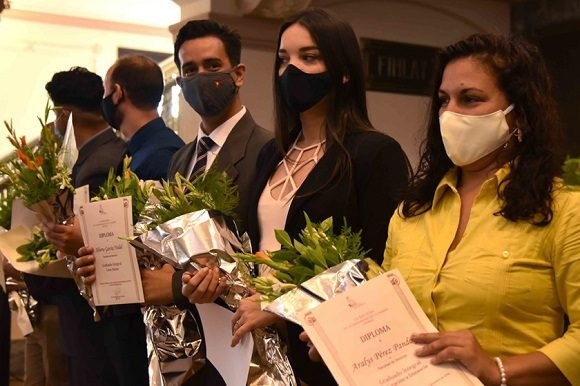
By Xavier Carbonell (14ymedio)
HAVANA TIMES – No one tells you how much more your place in life will depend on luck, chance or traps, than by any vocation or plan. No one is told that one thing is the subject they study – over four or five years with intermittent punctuality and driven by coffee – and the other thing is what they’ll actually end up doing: seldom anything executed with any passion, more often with reluctance – in the subsequent period between graduation and retirement. Few of us are lucky to have a benevolent cousin or philanthropic uncle that would dare to explain what our parents – victims themselves of the scam – concealed: that the degree certificate, that white rectangular piece of paper that adorns the walls of so many living rooms and caused so many tears to be shed and countless third degree burns in the eyelashes, is just a poor and useless talisman.
Seeing a university degree on the wall always seemed to me to be a rather macabre thing. It always had something of the gallows or autopsy about it, as though the only thing we were allowed to keep from our youth was this imitation parchment with its gothic lettering.
I think – but often I’ve kidded myself – that my generation doesn’t suffer from this superstition. Tired of the cult of the certificate, none of my friends or acquaintances goes around showing it off as a trophy nor teaches their kids – if they have any – to follow this curious religion. But clearly, very few of us play the role for which they supposedly prepared us. The mismatch has created some odd creatures: historian mechanics, waiter agriculturalists, photographer chemists, teacher masseuses, philologist prostitutes, nun electricians and psychiatrist swimming pool cleaners.
If we get something useful from the university, some training or way of seeing life, we do not owe it to the classroom or the curriculum, but to the conversations, the night, the books, the walks, the smoke and again to the coffee.
Maybe it was always like this. Perhaps real life and, even more so, underground or secret life depends on the gap between what one wanted and what is. I think, without going any further, of the writers I like to read and what they studied. Javier Marías studied English philology and Ricardo Piglia studied history, but Ernesto Sabato was a physicist and Carpentier was an architect. Lezama was a lawyer and Eliseo Diego abandoned his law degree to study pedagogy. I have never been very clear about what Borges studied or how much Cabrera Infante – a fugitive, like Severo Sarduy, from medicine – learned at the School of Journalism. The classic case is Roberto Bolaño, who before his novels finally gave him some money he was – if we believe him – a taxi driver, peddler, stevedore, farmer, dishwasher and night watchman.
It is not strange that in order to be able to write – or dance or play the trumpet like Gillespie, it does not matter – one has to find a profession that lets you eat, which does not have to be detestable because it is routine. The job is treated gently, no matter if it gives you bad times. Although, in truth, one would always like more time and fewer distractions and duties, the end of adulthood and the return of childhood, when the secret life was also the only one, and as simple as a battle of little soldiers.
The seriousness of the issue does not hit one’s own life so much – despite personal frustration – as that of the entire nation. How will a country that disrupted the plans of those who wanted to be translators or surgeons be able to function, twenty or thirty years from now? Who is going to occupy a Latin chair when the few who still know how to read it die? Where will the masters of restoration, the painters, the orchestra conductors, the chess players, the writers come from? Who will return from exile to tell those who stayed that the world continued to advance, while the Island became a garbage dump of diplomas and medals, which have always been better at the back of the display cabinet?
The truth is that few will return. Those with the superior faith or the forgetful, those who see a good opportunity or the very nostalgic. I don’t know if this will be my case, or if the return – which any emigre, no matter how cynical, dreams of – will come little by little, like someone who is afraid to open a door or draw a curtain. I don’t know if, as we did undoubtedly with the title, the most prudent thing is to keep the country in the drawer.
Translated by Translating Cuba
Read more from Cuba here on Havana Times




